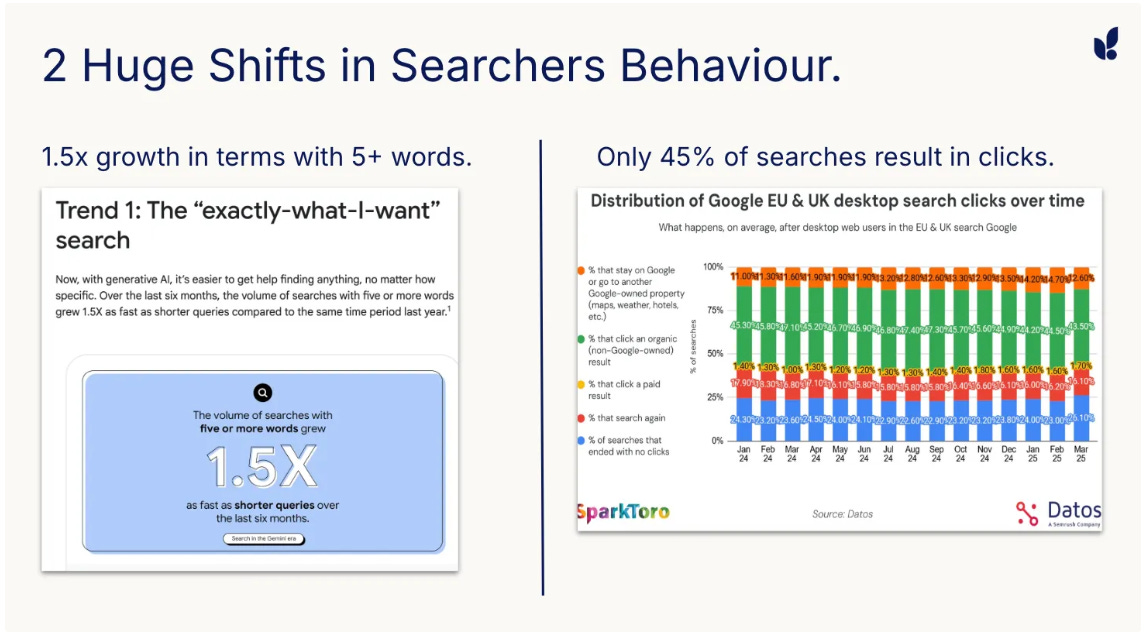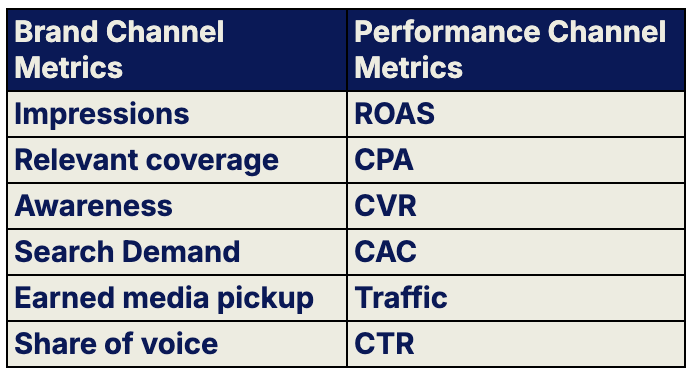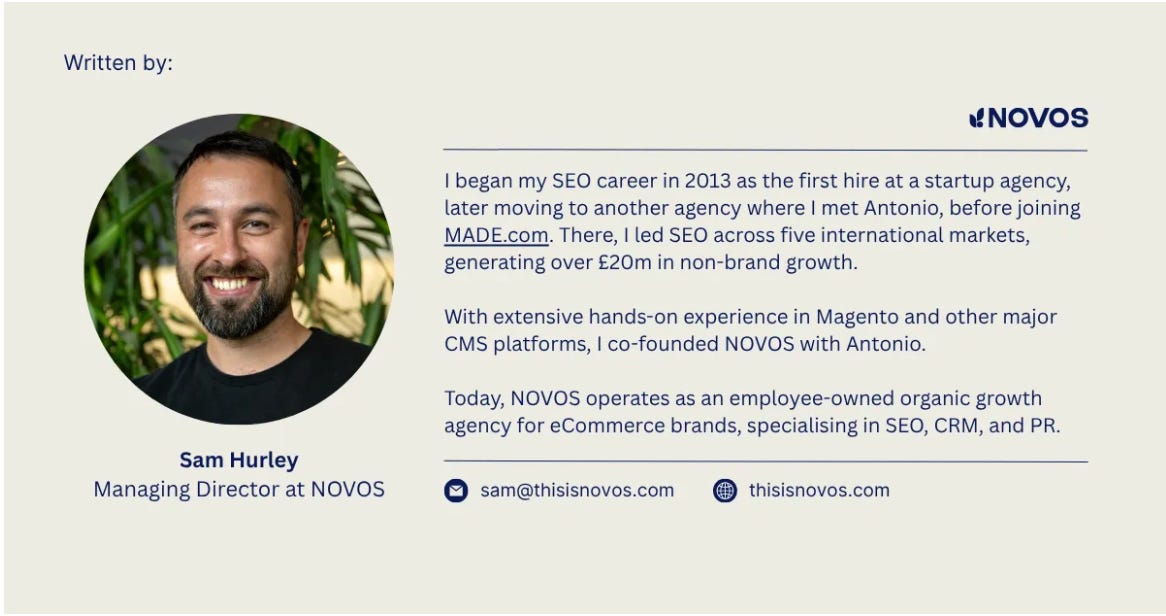UPDATED: SEO the Brand Channel -Insights After Industry Feedback
UPDATED: After discussions with other eCom leaders, here's what we want to clarify.
A few weeks ago, we shared our vision for SEO evolving into a brand channel for eCommerce brands.
Since then, we’ve spoken with clients, leads, industry peers, and hosted a webinar with the Commerce Future community. In this follow-up, we want to clarify our thinking and highlight key takeaways from those conversations.
Branded vs Non-Branded: Let’s Clear That Up
Some readers assumed we were shifting focus to only branded SEO (e.g., search terms that only include the brand name, e.g., “IKEA” or “IKEA sofas”).
That’s not what we’re saying.
We’re not deprioritising non-brand SEO search terms
Our core pillars remain: technical SEO, content, and links delivered strategically
We're still aiming to grow non-brand visibility, but it’s the measurement of success that’s different
What’s Changing? The Metrics.
The shift is in how we measure success.
For at least a decade, SEO has been a real challenge to measure and attribute direct revenue success to, made even harder by GA4.
AI Search is causing two big shifts in Search:
“Exactly what I want Searches ie 5+ words - the long long tail terms”
Now, only 45% of searches result in clicks. AI Search will reduce this even more due to AI Overviews + AI Mode.
Both of which will make revenue attribution even more complicated in the future.
The big difference and the reason WHY we believe SEO is becoming a brand channel is that the metrics we measure success by will change.
How do you measure the success of a performance channel vs a brand channel?
SEO has always been the hardest performance channel to measure: it's much longer-term, doesn't have its own analytics platform (in the same way Meta and Google Ads do), and is often less attuned to last-click attribution (especially since Google introduced Shopping).
Our "primary metrics" for success were traffic, revenue, and ROI.
We often rely on "secondary metrics" like keyword rankings, clicks, and visibility to show progress; however, the two significant trends referenced above show that AI search is making even these secondary metrics harder to measure.
This is why success metrics will need to change in the future.
We all know SEO has value and that the quality of SEO's audience is some of the highest available. We often need reminding that SEO still drives nearly 80-90% of the clicks from Google.
We now need to reposition SEO with brand-focused metrics. Historically, we've tried to report on performance metrics as much as possible. Still, with an even greater increase in zero-click searches, success naturally shifts toward brand channel metrics.
Even when you compare how you’d measure the success of a brand channel vs. a performance channel, we can see the historical challenge we’ve had measuring the value of SEO investment.
Only one of these metrics is available to SEOs: traffic/Clicks. These are now reducing, leaving us with nothing in the performance column.
Brand channels are traditionally difficult to measure due to their lack of data. However, compared to traditional brand channels, SEO is incredibly data-driven and can potentially be one of the most data-led brand channels available to retailers.
And to highlight something referenced in the last post:
“SEO is evolving from one of the hardest-to-measure performance channels into one of the most data-driven, measurable brand channels available to marketers”
We explored potential future metrics in last weeks post.
Real Example: Ruggable
Here’s a super basic example:
Ruggable gets ~60K branded searches/month
The keyword “rugs” also gets ~60K searches
By ranking Ruggable at #2 for "rugs", we essentially doubled their brand exposure via search
Without that ranking, they’d only appear to people already searching their name
Now amplify this illustration across the 50k+ non-brand keywords they rank for
SEO as a Demand Capture Channel
Think about how SEO captures demand that’s created elsewhere:
“Ruggable runs a TV ad → A viewer searches 'rugs' → If Ruggable isn’t ranking, the sale goes to a competitor.”
SEO ensures you're visible when that demand reaches Google.
SEO as a Demand Generation Channel
AI and generative tools are now creating demand, often in invisible ways:
“I showed GPT a photo of my hallway (situational search). It recommended Little Giant Ladders. I bought via Amazon. That brand has no idea I discovered them through GPT.”
“Google’s AI overview mentioned Rodd & Gunn for linen shirts. I browsed the site but didn’t buy. Days later, I walked past a store and spent a fortune. That sale wouldn’t be attributed to SEO- but it was 100% driven by it. Brand trust was created first by SEO and re-enforced by the store.”
The above examples are similar to how traditional brand channels like out-of-home operate. They're incredibly hard to attribute to creating demand and intersecting customers at the point of decision making - yet this intersection has huge value.
Why This Matters
The key shift: SEO is no longer just about clicks and traffic. It’s about:
Building brand awareness
Building brand trust
Measuring share of voice
Navigating both classic SEO + AI-driven search together
Becoming a Niche Authority
Amplifying existing performance activity
A Quick Recap from Our Original Post
SEO is evolving from one of the hardest-to-measure performance channels into one of the most data-driven, measurable brand channels available to marketers
Today, we’re operating in a hybrid world (classic + AI search)
Change = opportunity (the old tactics and rules are shifting)
Clients often ask:
“We’re top 3—why not #1?”
The honest answer: "The brands above you started investing years and years earlier. As a new era of Search starts, nows the time to invest"
What to Do Next
Reframe your SEO strategy around brand and visibility, not just conversions.
This is a new world of search which will naturally create new opportunities.
Invest early in SEO to future-proof your brand across both traditional and AI search.
Stay close to these shifts - subscribe to the blog if you're not already & share with others who also work at eCom brands 🙂
Next week’s post: What role does Digital PR play in AI Search
Week after that’s post: How to adapt your content for AI search - introducing our SEED framework - ensure you're signed up to get notified.






